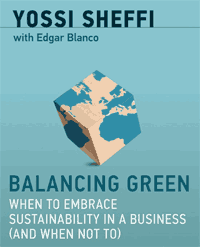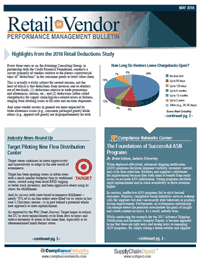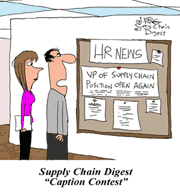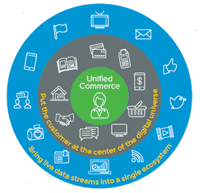Interview with MIT's Yossi Sheffi on "Balancing Green"
"Balancing Green," the new book by well-known supply chain thought leader Dr. Yossi Sheffi of MIT, is fast becoming one of my favorite books.
That is for several reasons. First, it is very well written, a good thing for book. Second, it is highly researched - interviews were conducted with some 250 companies, an unusually high number of direct sources.
And third - and more importantly - it is indeed very balanced, with some strong nods to sustainability, but with recognition of the often competing goals, making the point for investing for sustainability's sake alone is not a winning strategy.
Sheffi carves a middle path that is refreshing for its frankness and balance in the shrill debate on this and seemingly every issue in current times.
| GILMORE SAYS: |
Sheffi says that "maybe as millenials age and they have more purchasing power the market will change. Maybe, maybe not. So you hedge a bit."
WHAT DO YOU SAY?
Send us your
Feedback here
|
I did a review of the book a number of weeks back, and really just covered some of the introductory chapters, promising a part 2 before long. But the sheer amount of information in the book a real challenge to summarize in 1300 words, so I have decided on another approach - an interview with Sheffi. Not surprising to me, it was very interesting.
As evidence of that, early on in the interview, Sheffi led with this: "The sustainability movement has recently become a mantra that people just repeat without thinking, without data, without systemic analysis."
That's a provocative way to kick things off for sure.
As a result of this, Sheffi says, there is pressure on corporations to do things that sometimes just don't make sense, financially or otherwise. And at the same time, other people are frustrated that the government is not doing enough to mandate sustainability, notably in the area of requiring reductions in CO2 emissions. That drives investors, some consumers, NGOs, the media and others to put pressure on corporations to act, given slow government response.
And it is corporations that are the target for this book, "Because a lot of this just doesn't make any sense," Sheffi told me.
He noted that "Corporations cannot take deep sustainability actions - which take money and investments - unless customers are will to pay for it. And it appears in many cases they are not."
He cited the example of Ford, which just recently announced it is getting out of the business of selling small cars and most of the sedans. It will soon just make trucks and SUVs.
It's not that Ford is anti-Green, Sheffi said, noting that a few years ago it was named the top sustainable brand in the world.
Ford was "making a lot of statements, a lot of commitments - but it found the customers don't buy the small cars that are fuel efficient. So they are changing, because of what the customer wants," Sheffi said.
However, Sheffi said, "To be clear, I am not advocating companies should do nothing - far from it."
In this climate, there are three reasons for companies to do something, "whether the CEO believes this is the challenge of our times or a Chinese hoax - it doesn't matter." You have to love that line.
 The top reason to pursue sustainability is for what Sheffi calls "eco-efficiency" - to cut costs. This is what most companies are doing when they reduce energy consumption, put regulators on trucks so they can't go too fast, and take many other similar actions. The top reason to pursue sustainability is for what Sheffi calls "eco-efficiency" - to cut costs. This is what most companies are doing when they reduce energy consumption, put regulators on trucks so they can't go too fast, and take many other similar actions.
Here, Sheffi says, "There are many low hanging fruits, because they not only enhance sustainability, they reduce supply chain costs, so why not do it? Of course! It's a "two-fer."
The second reason to pursue sustainability is to reduce risk, Sheffi says.
"You don't want to be the company being attacked by some NGO, the media, etc. There are many examples of this," as we'll discuss below with regard to Nestle.
And the last reason to take sustainability actions is hedging - in case market dynamics change.
He notes that "All the surveys show that millennials are more sensitive to sustainability arguments than older people, so maybe as they age and they have more purchasing power the market will change. Maybe, maybe not." So you hedge a bit.
"But at this point, the truth is that even though most consumers are saying they will pay more for a sustainable product, they don't. When they go to the supermarket, they choose the one that is 10 cents or 10% cheaper rather than the one that is sustainable. So it's hard for companies to invest in this."
On the risk avoidance side, he cites the example of what food giant Nestle went through with its KitKat bar brand and use of palm oil, perhaps sourced at the time from farmers slashing rain forests in Malaysia to plant palm trees. Greenpeace went on the attack.
"If you want to see a really gory video and, you should look at Youtube," Sheffi noted. Of course, he says, Greenpeace chose "to talk about the impact on the orangutan, rather than you know on all kind of snakes."
The video shows someone snacking on a KitKat bar, and then the camera zooms in and you discover that person is actually chewing on the finger of an orangutan, with blood coming out of his mouth. Nestle soon changed its palm oil sourcing policies.
In the book, Sheffi writes that ""Brands are vulnerable, and NGOs know it."
"So the moral here is that one has to make sure that they are not target of attack, to take some meaningful sustainability actions to reduce the risk of being targeted," Sheffi said.
Next I noted that the title says it's about "balance" - is it truly a balance?
"Absolutely" Sheffi told me. "People use slogans like "planet versus profit" or "people versus profit." I think all of this is wrong. The way companies should think about it is that it's really not people versus profit or planet versus profit. It's actual people versus people."
That, he says, is because it's people who are alarmed by the chance of global warming and are worried about a sustainable future. But on the other side are people who are worried about jobs, and being able to afford necessities.
"My point is that both are right," said. "And companies are doing actually both. Companies are supplying necessities all over the world doing it in relatively low cost today as compared to years ago. And at the same time, they are providing jobs to millions of people."
He added: "The point is, there's no right or wrong here. That's my point in the book. It's two rights. And as long as people understand this and don't talk past each other like Republican and Democrats in Congress, and try to find out common grounds, we can get some solutions."
Sheffi also noted how fundamentally sustainability is a supply chain issue. It's easy to be Green, he said, if you outsource most of your production and logistics and let those companies emit all the CO2. I will note that in the book there are examples of how to do complete analysis and calculate the carbon footprint of the entire supply chain.
The sub-title of the book is "When to Embrace Sustainability in a Business (and When Not To)." Delivering on that promise comprehensively is a tough one, and there is no clear path for companies to balance the competing objectives and pressure, but Sheffi does about as good a job as possible to lay out a framework for charting a course.
As I said in part 1, I highly recommend it.
What's your take on Sheffi's views on sustainability? What would you add? Let us know your thought at the Feedback button below. |



![]()

![]()

![]()












